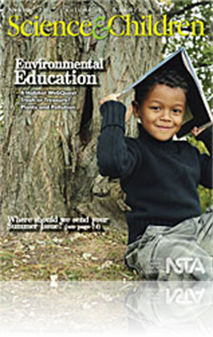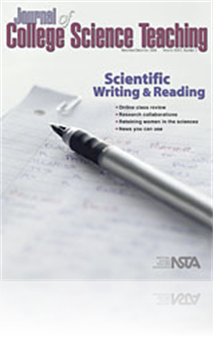All Science and Children resources
Journal Article
Perspectives: Making Time for Science Talk
Cognitive scientists (Donovan and Bransford 2005) conclude that when teachers “simply give students the knowledge to incorporate, the practice and skill development of doing one’s own mental search is shortchanged”, but when students engage in ...
Journal Article
Teaching through Trade Books: Into the Woods
In today’s electronic age of video games and mp3 players, children are not spending as much time outdoors as past generations did. Many fear that as a result children are becoming increasingly alienated from the natural world. This month’s trade ...
Journal Article
A five-week study taught students how to write a field guide that identified the plants in a small wooded area they passed through on their way to their school playground. By creating this authentic genre of science writing, students came to understa...
Journal Article
Most children know they should not pollute but have never considered why. One elementary school teacher creates a lesson for third- through fifth-grade students that makes the connection concrete. In the lesson, students consider the possible effects...
Journal Article
Methods and Strategies: The Teaching-With-Analogies Model
Teachers often use analogies and are unaware of it—they are using them automatically. Whenever they begin an explanation with “It’s just like…,” “It’s similar to…,” or “Think of it this way…,” they are using an analogy to expl...
Journal Article
It’s no secret that many school programs don’t give children enough opportunity to explore the natural world—i.e., to “mess about” and to have firsthand experience with nature and animals. Not so at the Muscota New School in New York City! ...
Journal Article
The WebQuest is a four-step process integrated at appropriate points in the Animal Studies unit. Through the WebQuest, students create a series of habitat maps that build on the knowledge gained from conducting the various activities of the unit. The...
Journal Article
Editor's Note: Looking at Environmental Education
Science education must prepare students to make informed personal and political decisions. Many of those decisions will revolve around issues of the environment. We are drenched daily in reports about alarming environmental trends. The learning envi...
Journal Article
The Early Years: The Sun's Energy
Understanding the connection between the Sun’s energy and sustaining life is difficult for preschoolers, but learning about these concepts through both long and short-term activities captures children’s short attention spans. Activities such as ...
Journal Article
Science Shorts: Energy in Motion
Children experience forces at work while on the playground, in gymnasiums, and in toy stores. Scooters, baseball bats, basketballs, and jump ropes all need pushes or pulls to make them move. When objects change shape as they are pushed or pulled, we ...
Journal Article
Maria lifts up a book from the table. Dietre eats cereal for breakfast. Akisha winds up a toy robot. Jacob puts batteries in a flashlight. These seemingly dissimilar events demonstrate various ways children experience energy daily. You can help prima...
Journal Article
In sixth grade, students understand that Earth gets visible light from the Sun, but students may also believe the Earth gets heat from the Sun. This last part is incorrect because the Sun is too far from the Earth to heat it directly. So, how does t...




